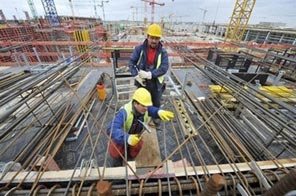Germany, France edge out of recession
BERLIN: Two of Europe's biggest economies, Germany and France, emerged from recession on Thursday as both recorded unexpected growth in a further sign that a recovery is beginning to take shape.
A day after the Federal Reserve said the recession-hit US economy was stabilising, official statistics showed that Germany and France both achieved positive growth of 0.3-percent in the second quarter of the year.
The news was particularly welcome for German Chancellor Angela Merkel ahead of polls next month as Europe's biggest economy had not seen positive growth since the first quarter of 2008. Analysts had forecast a 0.2-percent drop.
The figures from France were equally unexpected as the national statistics office INSEE had forecast a 0.6-percent drop and the Bank of France a 0.4 percent contraction for the quarter.
"After four quarters of negative growth, France is finally coming out of the red," French Finance Minister Christine Lagarde said on RTL radio.
France had also been in recession for the last 18 months and its economy contracted by 1.2 percent in the first quarter.
Recession is widely understood to be a run of two quarters or more of contracting output in a row.
The results from Berlin and Paris came ahead of the release in Brussels of second quarter growth figures for the 16-nation eurozone.
Figures from other parts of Europe showed however that many countries are still firmly in the grip of recession.
For example, Austria's economy slowed further in the second quarter of the year while Slovakia's economy contracted by 5.3 percent on a 12-month comparison in the second quarter and the Hungarian economy shrank 2.1 percent.
The Dutch economy meanwhile exceeded its previous longest period of recession by shrinking 0.9 percent in the second quarter.
Britain, which is not part of the eurozone, released figures on Wednesday showing that its economy sharnk by 0.8 percent -- the fifth quarterly contraction in a row -- while unemployment hit a 14-year high.
The Bank of England also said that recovery would be slow and that "the timing and strength of that recovery remains highly uncertain."
Europe's main stock markets all rose at the opening of trade following the results from Germany and France.
Frankfurt's DAX 30 climbed 0.14 percent to 5,357.77 points, the Paris CAC 40 won 0.11 percent to 3,511.19 points and in London the benchmark FTSE 100 index gained 0.22 percent to 4,727.10.
The rises followed a rally in US stocks, buoyed by comments from the Federal Reserve that recession-mired economy is stabilising as it announced a scaleback in its massive pump-priming effort.
Concluding a two-day monetary policy meeting, the Federal Open Market Committee (FOMC) said that "economic activity is leveling out" and maintained its near-zero interest rate policy.
The FOMC announced it would be scaling back purchases of Treasury bonds as it extended the 300-billion-dollar programme by one month, to October.
Joel Naroff, an analyst at Naroff Economic Advisors said the change in the Fed statement saying the economy was "leveling out," replacing a June phrase that "the pace of economic contraction is slowing," was significant.
The change "indicates to me the members believe the recession is basically over," Naroff said.
US President Barack Obama said last week that a surprise drop in job losses was another sign "that the worst may be behind us".
However the International Energy Agency warned on Wednesday that evidence of "green shoots" of recovery was patchy, and in several leading economies, unemployment was still rising and is expected to do so for some time.
"Has the global recession ended?" the IEA asked. "The most that can be said is that the global economy may be stabilising -- but even if this is confirmed, it remains far from evident that growth will resume strongly before the end of the year."






